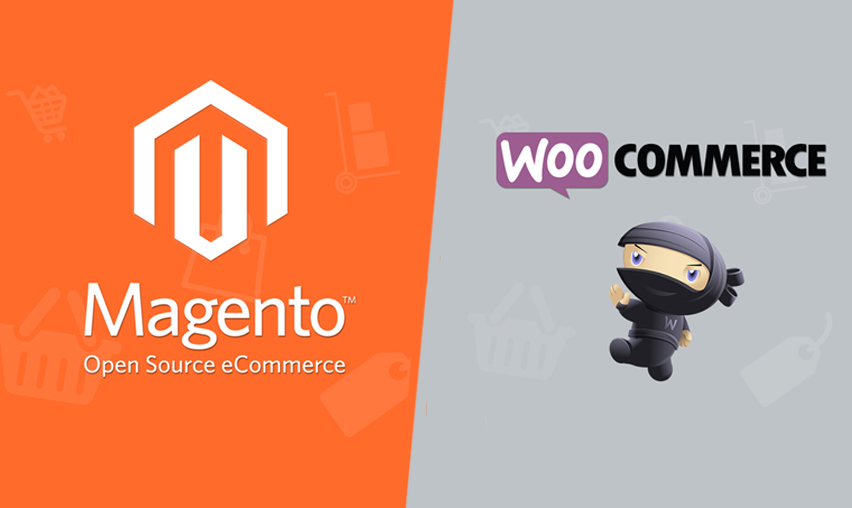Isn’t this the million dollar question on everybody’s mind? Everyone who is concerned with taking their online business to a new level at least! This is almost as close as Sophie’s Choice as there’s no clear direction, no clear winner! Both platforms have their own set of USPs which are equally fruitful.
Magento and WooCommerce are two of the most popular e-commerce platforms around the world, used by millions of web developers left, right and centre. No wonder this Magento Vs. WooCommerce has been a source of endless blogging debates and what not. One of these can be labelled as a ‘standalone’ entity under the tag of eBay whereas the other one is a WordPress plugin. Talk to any top Magento development company out there or technically astute Woocommerce developers, and they will tell you that these 2 platforms should be on the top of your priority list if you’re setting up an online business.
However, just like everything else, there must be a winner. Let’s dissect these two platforms right to their nitty-gritties and try and find the one which will be more suitable as per your needs.
Similarities Between Magento VS. WooCommerce
- First things first, both Magento and WooCommerce follow an open source regime. For non-techies, being an open source platform gives developers the freedom to customize. Since the original platform code is accessible to everybody, you can choose to modify it according to your requirements. As a business owner, you can be pleased by the fact that you will have the help of an entire programming community.
- Both of these platforms fall under the ‘Freemium’ label i.e. Free + Premium. Of course the platform is free to use traditionally, but it is highly likely that you’ll need to incorporate multiple ‘extras’ as and when your entity grows. Magento and WooCommerce come with such paid plug-ins to enhance your e-commerce experience.
- You can upload and manage countless products via both platforms. This helps with the scalability aspect. Of course, you’ll want to expand as much as possible; hence this flexibility quotient really comes in handy when you do.
- These platforms come with the option of adding a blog to your website to optimize your Magento SEO quotient. Blogging is a given these days! Everyone does it, and there are good reasons why.
- Magento and WooCommerce both allow you to track, view and manage Analytics of your website. You can seamlessly connect with Google Analytics and get to know the intricacies of your business, demographics, audience, trends and much more.
Comparing Aspects: Magento vs. WooCommerce
1. The Deployment Aspect
Setting up an online entity comes with a series of pitfalls; however, you don’t want your e-commerce platform choice to be one as well.
If you’re using WordPress already, opting for WooCommerce becomes a no brainer as you wouldn’t have to migrate or look for interfaces. Being an extension of WordPress itself, WooCommerce is tailor made for beginners too owing to its wide range of plugins, easy setup and tutorial videos for assistance.
Magento largely has the same capabilities; however, it falls short when it comes to adding extensions to your existing website. Not only will you need a Magento-specific programmer, the overall process becomes a tad expensive as well.
2. The Money Aspect:
Primarily, both these platforms are free to use. However, Magento comes with a pre-defined Enterprise version. You just need to download these platforms and get cracking on your online entity.
However, as and when you keep on growing, you’ll realize that you need monetary backing power. Teaming up with simply bank transfer and PayPal wouldn’t do. This is where WooCommerce gets a little handicapped.
That being said, even with Magento, you will need to fork out tons of money when it comes to adding extensions and plug-ins. Given the fact that Magento developers are much harder to find than WordPress programmers, the balance might tip in the latter’s favour.
Another costing aspect that you might’ve overlooked is hosting. Running WooCommerce is plain and simple as it simply requires WordPress hosting. If you want to team up with Magento, you will need accessibility to a good hosting plan or dedicated servers to suffice your needs. If you act otherwise, your website will suffer and it will start running slowly.
3. The ‘Customer Shopping Experience’ Aspect
Both of these e-commerce platforms are duly adept with a seamless shopping cart facility along with the capacity to sell countless products with categorization. However, the real test begins much later.
When it comes to additional facilities that you can give to your customers while shopping, Magento fits the bill. You can not only compare your products, but upsell and cross-sell them as well. You can incorporate discount coupons and codes readily to get your sales up. Also, you can implement advanced level filters to ensure easy navigation.
4. The ‘Additional Store’ Aspect:
Of course, at some stage of your online business, there will come a time when you will spread your wings or at least hope for it. At that time, you will need to expand your online store and possibly add another to your repertoire.
This is possible if you have Magento if you need more localized versions of your online entity.
5. The ‘Product Dealing’ Aspect:
WooCommerce is traditionally much simpler than Magento which is good news if you’re just getting your online business up and running. In terms of products, WooCommerce will allow you segregate best sellers and rate products as well. If you need any help you can contact developers who provide WooCommerce Development Services.
Since it is a WordPress plug-in, it can seamlessly integrate with a plethora of other WP plug-ins as well.
6. The ‘Extensions’ Aspect:
WooCommerce by default gives you access to the WordPress plug-ins, some of which are completely free as well. Some examples include the likes of Yoast SEO (helps to improve your search rankings), Askimet (acts as a spam filter) and more.
Magento on the other hand, offers thousands of extensions for you to choose from. But, to implement those, you will need to take services of skilled Magento developers.
The Final Verdict
An important thing to remember is that Magento was specifically designed to cater to e-commerce stores. Hence, if you belong to a separate domain, think otherwise. Magento’s scalability quotient makes it an ideal fit for those who see expansion in their near future, that too at a larger scale than the average Joe. The basic features of Magento are higher in number than its counterpart. However, it is worth noting that you’d need to spend the extra buck and hire a potent web developer to execute it. On the contrary, you wouldn’t need to opt for a WordPress development company to fulfil the same needs. WooCommerce hence becomes the go-to option for smaller and some medium sized businesses as well.
The bottom line is – If you can afford to hire proper help, go for Magento as that will expand your business horizon by manifolds. But going by the general trend of nascent businesses which need to be cost efficient at first, WooCommerce seems like the way to go.
Contact us now for free consultation about your eCommerce website


